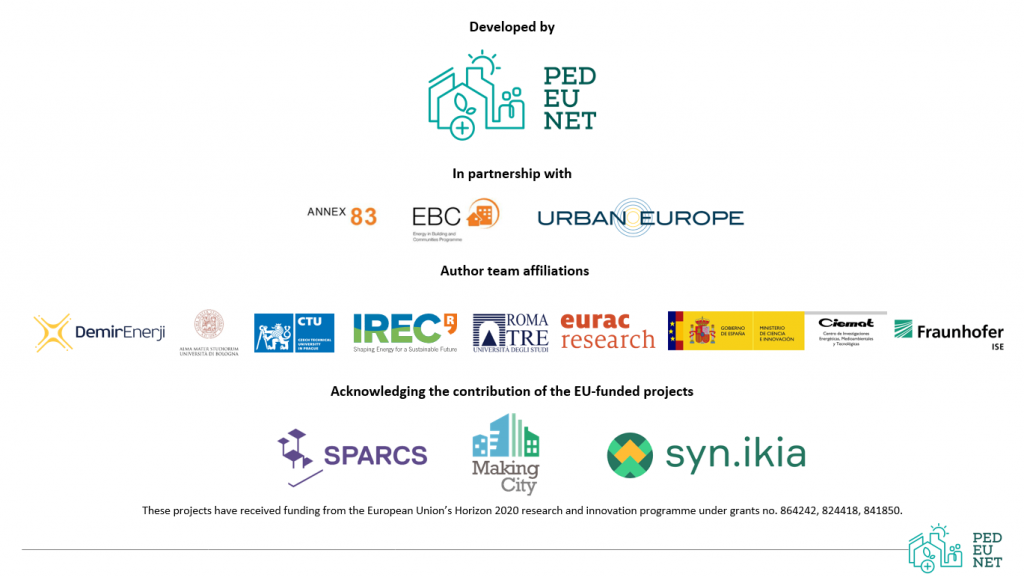| D1P001: Name of the project | |
| D1P001: Name of the project | CO2PED |
| D1P002: Project assigned code | |
| D1P002: Project assigned code | F-DUT-2022-0327 |
| D1P003: Start date | |
| D1P003: Start date | 01/24 |
| D1P004: End date | |
| D1P004: End date | 12/26 |
| D1P005: Ongoing project | |
| D1P005: Ongoing project | Yes |
| D1P006: Funding programme/financing model | |
| FP7/H2020/HEU/DUT | no |
| Interreg | no |
| National funding | no |
| Public-Private Partnership - please specify | no |
| Other | no |
| D1P007: Estimated project costs (Mill. €) | |
| D1P007: Estimated project costs (Mill. €) | 1.127 |
| D1P008: Description of project objectives/concepts | |
| D1P008: Description of project objectives/concepts | Urban energy transitions might risk not reaching vulnerable neighbourhoods across Europe. The CO2PED project aims to change that by empowering residents and neighbourhood associations as active agents in the transformation of their neighbourhoods. Together with academic partners and local governments, the project will support community groups co-producing tools for collective agency in 8 neighbourhoods in Belgium, Estonia, the Netherlands, and Portugal. As a result, the co-production process can strengthen the capacity of municipalities and other stakeholders to facilitate more inclusive energy transition strategies for the development of positive-energy districts (PEDs). The results could be replicated across Europe, ultimately contributing to the implementation of the EU Urban Mission and Green Deal. |
| D1P009: Description of project upscaling strategies/potential | |
| D1P009: Description of project upscaling strategies/potential | |
| D1P010: Number of PED case studies in the project | |
| D1P010: Number of PED case studies in the project | 8 |
| D1P011: Case Study | |
| D1P011: Case Study | |
| D1P012: Description of project expected impact | |
| D1P012: Description of project expected impact | |
| D1P013: Standardization efforts | |
| D1P013: Standardization efforts | |
| D1P014: Sources | |
| D1P014: Sources | |
| D1P015: Can you specify a suitable contact person regarding the load-management approach within your PED project? | |
| Name | Prof. Dr. Tim Devos |
| tim.devos@ugent.be | |
| D1P016: Would you be willing to share data from your PED project for research purposes? | |
| D1P016: Would you be willing to share data from your PED project for research purposes? | Yes |

Authors (framework concept)
Beril Alpagut (Demir Energy); Giulia Turci (University of Bologna); Michal Kuzmic (Czech Technical University in Prague); Paolo Civiero (Università Roma Tre); Serena Pagliulia (University of Bologna); Oscar Seco (CIEMAT); Silvia Soutullo (CIEMAT); Daniele Vettorato (EURAC Research, IEA Annex 83); Bailador Ferreras M. Almudena (CIEMAT); Vicky Albert-Seifried (FHG ISE)
Contributors (to the content)
Laura Aelenei (LNEG), Nienke Maas (TNO), Savis Gohari (OsloMet), Andras Reith (ABUD), Ghazal Etminan (AIT), Maria-Beatrice Andreucci (Universita Sapienza), Francesco Reda (VTT, IEA Annex 83), Mari Hukkalainen (VTT), Judith-Borsboom (Locality), Gilda Massa (ENEA), Jelena Ziemele (University of Latvia), Nikola Pokorny (CVUT), Sergio Diaz de Garayo Balsategui (CENER, IEA Annex 83), Matthias Haase (ZHAW, IEA Annex 83), Christoph Gollner (FFG, JPI UE), Silvia Bossi (ENEA, JPI UE), Christian Winzer (Zurich University of Applied Science), George Martinopoulos (Centre for Research and Technology Hellas), Maria Nuria Sánchez (CIEMAT), Angelina Tomova (Energy Agency of Plovdiv), Oya Tabanoglu (Demir Enerji), Jelena Brajković (University of Belgrade), Juveria Shah (Dalarna University), Michela Pirro (ENEA), Francesca Sabatini (University of Bologna)
Implemented by
Boutik.pt: Filipe Martins, Jamal Khan
Marek Suchánek (Czech Technical University in Prague)